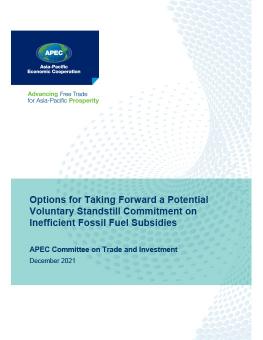
Options for Taking Forward a Potential Voluntary Standstill Commitment on Inefficient Fossil Fuel Subsidies
The study supports the exploration of options for a voluntary standstill on inefficient fossil fuel subsidies, including a review of existing standstill commitments, identification of potential actions APEC member economies could take to implement a standstill on such subsidies, considerations for ensuring that a standstill process is just, and the potential implications of a standstill on APEC member economies. The study was completed to support APEC officials in carrying out the task set by APEC Ministers Responsible for Trade “to explore options, for those members that are in a position to do so, to undertake a potential voluntary standstill on inefficient fossil fuel subsidies.”
As specified in the joint statement made by the Asia-Pacific Economic Cooperation (APEC) Ministers Responsible for Trade on 5 June 2021, “market-distorting subsidies undermine a level-playing field.” The Ministers also noted increasing concern about subsidies that have a negative environmental impact. APEC member economies made a commitment in 2009 to rationalize and phase out fossil fuel subsidies (FFSs) that encourage wasteful consumption; subsequent restatements of this commitment by APEC member economies added the qualifier “inefficient” in front of FFSs. Building on this background, APEC Ministers Responsible for Trade tasked APEC officials to explore “options, for those members that are in a position to do so, to undertake a potential voluntary standstill on inefficient fossil fuel subsidies.” This study is intended to support the exploration of standstill options, including a review of existing standstill commitments, identification of potential options for a standstill on inefficient FFSs, considerations for ensuring that a standstill process is just, and the potential implications of a standstill on APEC member economies.
Standstills have an international track record of use in trade in particular, but also in other forums, including environmental and sustainable development agreements. A standstill on inefficient subsidies has the benefit of creating a voluntary agreement amongst APEC economies in a position to do so to ensure that inefficient subsidies do not increase and exacerbate any adverse impacts. A voluntary standstill can also complement existing individual efforts that APEC economies are undertaking to support inefficient fossil fuel subsidy reform.
Based on the research conducted as well as feedback from a workshop held on 19 August 2021, the following options could be explored to undertake a potential voluntary standstill on inefficient FFSs for APEC member economies that are in a position to do so:
a) Adopt an inventory-based voluntary standstill commitment: In this case, a standstill would be based on an inventory (list) of an economy’s inefficient FFSs. Economies that are in a position to do so would commit to not adding any new items to the inventory. Further, a voluntary commitment could be made that any inefficient FFSs within the inventory that already had a specified end date would not be extended beyond that expiration date.
b) Adopt a value-based voluntary standstill commitment: In this case, a standstill would prohibit the financial value of inefficient FFSs from increasing compared to a set baseline (e.g., a particular year or an average over a period).
c) Adopt a hybrid standstill commitment: This could be inventory-based for certain categories of inefficient FFSs and value-based for others. Noting the weaknesses of the purely inventory-based and value-based approaches, one option would be to use an inventory-based approach for inefficient FFS categories like direct transfer of funds; tax expenditure, other revenue foregone and under-pricing of goods and services; and transfer of risk. A value-based approach could be used for the induced transfer (price support) category.
Participating experts
You might also be interested in
The Cost of Fossil Fuel Reliance
Government support for fossil fuels reached at least USD 1.5 trillion in 2023, new data shows.
Increased Support Needed to Achieve India's Clean Energy Goals
India is on track to achieve many of its 2030 clean energy goals but needs to step up government support measures to accelerate the deployment of offshore wind, electric vehicles, and green hydrogen, according to a new report.
Ending Export Credits for Oil and Gas: How OECD countries can end 2024 with a climate win
For a year now, Organisation of Petroleum Exporting Countries (OECD) governments have been negotiating an agreement that could put an end to oil and gas export finance. Following the acrimony in Baku, this would be a very real way for the OECD to show policy coherence, respond to calls from the poorest countries to stop subsidizing fossil fuels, and shift public finance to solutions.
Fossil Fuel Production, Renewable Energy, and Subsidy Reform in Nationally Determined Contributions 3.0
This policy brief provides an analysis of the critical benchmarks and recommendations necessary for aligning nationally determined contributions (NDCs) with the 1.5 °C target.